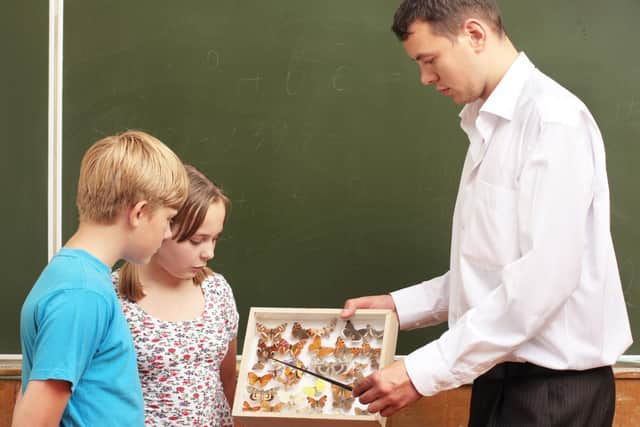How can we get children interested in nature if there’s no one to inspire them? - Sarah Todd
The trio of charities says there is just enough of the UK’s natural world left to save if the general public and business get behind this initiative.
The idea is for us to commit to “Go Wild Once a Week” by doing something on a regular basis to support nature.
Advertisement
Hide AdAdvertisement
Hide AdWhile not wanting to be a glass half empty merchant, this correspondent can’t help but wonder whether this is shutting the door after the horse has bolted.


Speaking as a child of the 1970s (a generation constantly alert for finds to bring in for the school nature table) an interest in the wider world was, forgive the pun, second nature. We were so proud of the birds’ nests, feathers, sheep’s wool and suchlike we gathered for the table; using our pocket guide Observer’s books to learn how to identify trees, birds, butterflies and so-on. As a result of this we were so much more in tune with the pattern of spring, summer, autumn and winter and their impact on the landscape and wildlife than the generations that have followed.
Ask a current primary school child to identify a leaf from a tree and it will start to become clear what an uphill struggle Sir David and the campaign are facing. In fact, never mind being able to name a tree from its leaf or a bird from a feather, instead ask an otherwise intelligent child of eight years-old to simply name five native varieties of either tree or bird. Don’t do it if there’s a bus to catch.
While we gathered acorns and played conkers the majority of this latest cohort will walk on oblivious. Has anybody pointed out the robin in the garden at Christmas or made a point of listening for a cuckoo in spring? Chances are, in spite of any politically correct green posturing, their parents will be just as useless.
Advertisement
Hide AdAdvertisement
Hide AdSomething terrible has happened. Collecting a jam jar of frogspawn, digging up worms and keeping caterpillars has been erased as an important part of childhood. Instead, they are being smothered by schools chasing good Ofsted reports.
If teachers inspired youngsters to be nature lovers - a big difference to indoctrinating them to be mini Greta Thunbergs - then they would deserve a pay rise.
Thinking aloud, how many currently at the chalkface have any nature knowledge themselves? It’s all health and safety risk assessments and handwashing. Yes, children’s over-cleanliness is symbolic.
We might have given our hands a quick rinse before turning on the television for the designated children’s programmes that were on the box at school hometime. Nature came into our homes, and hearts, this way as well.
Advertisement
Hide AdAdvertisement
Hide AdFlipper told the story of a marine preservation warden (how ahead of its time is this?), his sons and their pet dolphin. Then there was Skippy the kangaroo forever dodging bushfires and, of course, Animal Magic. Presenter Johnny Morris’s voiceovers of the animals at Bristol Zoo were punctuated with educational segments from sidekick Terry Nutkins. For example, new technology was used to ‘shrink’ Terry so he could report on life from an ant’s point of view or swim on a riverbed. Nutkins went on to host a new children’s wildlife programme called The Really Wild Show, which continued with Michaela Strachan and naturalist Steve Backshall, who holds a Master’s degree in bioscience. The sort of person worthy of any child’s admiration.
Blue Peter got us into recycling before it became trendy.
Just last week ITV announced plans to wind down its dedicated CITV channel and push children’s programming predominantly online. And as for the BBC, it was way back in 2020 that it axed Newsround after 48 years from its teatime slot, glibly giving up and declaring the typical child no longer turns on traditional television when they come home from school.
It’s hard not to wonder about a world that gets in such a spin over the presenter of a football programme but isn’t up in arms about the lack of inspirational and educational programmes for children.
If sitting upstairs in their bedrooms, hunched over a screen rather than sat around a traditional television in the family sitting room watching inspirational presenters is progress, then there is no hope for our own species - let alone nature.